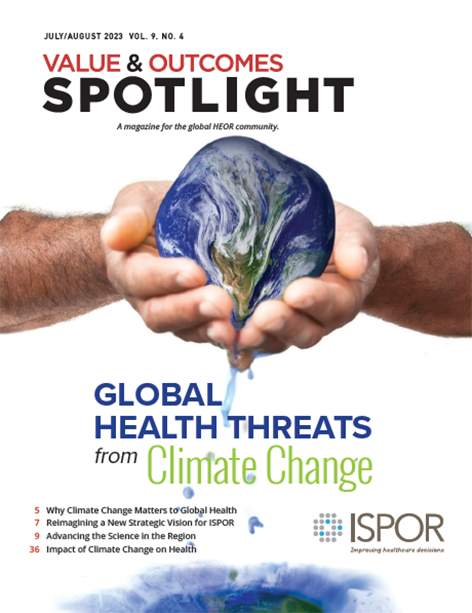Research Roundup
Section Editor: Aakash Bipin Gandhi, BPharm, PhD, Methodologist Expert, RWD, Sanofi, Cambridge, MA, USA
Climate Change and Health: Three Grand Challenges.
Campbell-Lendrum D, Neville T, Schweizer C, Neira M. Nat Med. 2023;29(7):1631-1638.
Summary
The article by Campbell-Lendrum et al summarizes 3 key directions that society can undertake to mitigate the impact of climate change on health. First, actions that have a direct effect on reducing carbon emissions that can, in turn, improve health should be promoted. Second, future health systems should be built in a manner that ensures climate resilience and low carbon emission. Third, public health measures and interventions should be in place to mitigate and protect individuals from the health-related climate risks. Overall, the article highlights the role that the health community can play in providing leadership and advocacy to guide the transformation of health systems into climate-resilient and low-carbon emitting settings. Further, efforts by healthcare community can serve as a model of excellence for other sectors whose actions may also negatively influence climate change.
Relevance
The negative impacts of climate change on public health continue to increase at a rapid pace. Major societal changes that have associated financial implications are required to mitigate the adverse consequences of climate change on public health. However, the financial implications are outweighed by the resulting positive health benefits and long-term economic gains through the creation of a suitable environment where humans can continue to thrive.
Circular Economy Strategies for Combating Climate Change and Other Environmental Issues.
Yang M, Chen L, Wang J, et al. Environ Chem Lett. 2023;21(1):55-80.
Summary
The article by Yang et al provides an overview of various circular economy strategies that help reduce carbon emissions keeping in mind aspects such as waste management, climate change, energy, air and water quality, land use, food production, and lifecycle assessment. In their findings, the authors observed that there are increasing challenges associated with the use of bio-based materials especially in terms of land use and cover. Further, the implementation of carbon removing technologies is extremely expensive ranging from $100 to $1200 per ton of carbon dioxide. Consequently, only a small number of companies have pledged to climate change goals as part of their future strategy and growth. In summary, the authors state that while circular economies can be introduced in various sectors, a high degree of system optimization is required to guide its implementation. To this effect, the authors propose a theoretical foundation which can guide the implementation of cost-effectives routes that result in circular economies in industrial, agricultural, and commercial fields.
Relevance
With an ever-increasing need for global industrialization and resultant dependence on nonrenewable energy sources, there has been a substantial production of solid waste and pollution which has adversely affected the climate. Implementation of circular economies are projected to help achieve carbon neutrality through decreasing carbon emissions by 45% by 2030.
Thinking Health-Related Behaviors in a Climate Change Context: A Narrative Review.
Chevance G, Fresán U, Hekler E, et al. Ann Behav Med. 2023;57(3):193-204.
Summary
The objective of this article was to identify the bidirectional relationship between climate change and health-related behaviors. Further, based on the findings, the authors also propose key actions that can be followed by the behavioral medicine community to mitigate the adverse effects of climate change on health behaviors. Specifically, the authors investigated 2 primary concerns. First, the impact of climate change events such as increasing temperatures, air pollution levels, and rising sea-levels on health-related behaviors such as eating, physical activity, sleep, substance abuse, and preventive care. Second, the authors also studied the inverse relationship where they explored the positive and negative impact of health-related behaviors on climate change.
Relevance
Past evidence has displayed that climate change substantially increases the current and future risks of unhealthy behaviors. Health behaviors that accelerate climate change may be considered as unhealthy behaviors and need to be addressed with suitable interventions in a timely manner to mitigate any adverse consequences.


